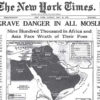The following is an article from the media watchdog group Fairness and Accuracy in Reporting (FAIR). It exposes the subtle and not-so-subtle propaganda and psy-ops engaged in by the New York Times to lead its readers to think that Iran’s non-existant nuclear program is a fact, while the nuclear arsenal that Israel blackmails the world with is merely an alligation at most.
The New York Times’ Nuclear Uncertainty Principles
Israeli laboratory model of a nuclear warhead core–photographed by Mordechai Vanunu.
Covering a speech by Iranian President Hassan Rouhani, theNew York Times (2/4/15) reported that he “asserted that the nuclear weapons amassed by the United States and, he said, possessed by Israel, have done little to ease their worries about vulnerability to attack.”
What’s the role of the phrase “he said” in that sentence? It’s to make sure that the New York Times is not saying in its own voice that Israel, which refuses to say whether it does or does not have nuclear weapons, actually does have them: It’s Rouhani saying Israel has nukes, not the Times.
I don’t know that there’s anyone who seriously argues that there’s any actual doubt thatIsrael has nuclear weapons; if there were any lingering questions, they were resolved by the revelations of Mordechai Vanunu, a whistleblower who exposed details of Israel’s nuclear warhead lab in 1986 and was imprisoned by Israel for 18 years as punishment. Later on in the piece, in fact, the Times notes that “the Arms Control Association, a research group in Washington, says Israel is believed to have 100 to 200 warheads.”But it’s still treated as claim to be attributed to a source rather than a verified fact.
Contrast that with the Times‘ handling of the question of Iran and nuclear weapons research. The government of Iran denies in no uncertain terms that it is seeking such weapons, and US intelligence agencies believe it is telling the truth, as the New York Times has reported: “American intelligence analysts continue to believe that there is no hard evidence that Iran has decided to build a nuclear bomb,” the Times‘ James Risen and Mark Mazzetti reported in a front-page story (2/24/12).
Nevertheless, the Times has repeatedly referred to the existence of an Iranian nuclear weapons program as a fact, not an allegation. Thus the paper (11/19/13) reported that “a bipartisan group of the Senate’s top foreign policy and national security committees urged Mr. Obama to reject any nuclear deal with Iran that did not include a tangible rollback of its nuclear weapons program.” Likewise, it reported that Obama (11/9/14) “said America continued to seek an arrangement with Iran that would end its nuclear weapons program.” The Times (6/17/13) editorialized:
The election of Hassan Rouhani as Iran’s next president creates an opportunity to move forward on a negotiated agreement to stop Iran’s nuclear weapons program and to begin to repair three decades of hostility with the United States.
This treatment of Iran’s quite possibly nonexistent nuclear program as though it were an established fact showed up even in a New York Times correction (8/1/14; FAIR Blog,8/1/14):
An article on Wednesday about demands among both parties in Congress that the Obama administration allow a vote on any agreement with Iran on its nuclear weapons program misstated, in some editions, the value of assets that Iran will have access to under an agreement. It is more than $2 billion, not more than $2 million.
This correction was noted by the Times‘ internal After Deadline blog (9/23/14)–not because it treated something that is likely imaginary as though it were definitely real, but because the numerical mistake should have been obvious: “Assets of $2 million would seem to be loose change in a context like this.” The blog, subtitled “Newsroom Notes on Usage and Style,” pointed out:
Like names and dates, numbers are among the most basic facts the Times reports–and getting those facts right is the foundation of our journalism.
When it comes to nuclear weapons, however, basic facts seem to be subject to political revision.







